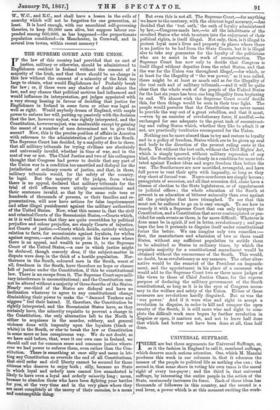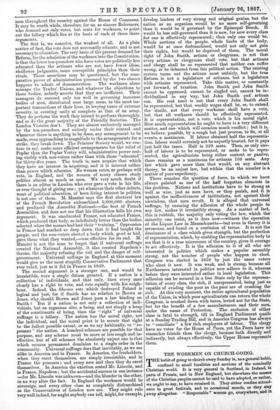UNIVERSAL SUFFRAGE.
THERE are but three arguments for Universal Suffrage, or, as it the fashion in England to call it, manhood suffrage, which deserve much serious attention. One, which M. Mazzini produces this week in our columns is, that it educates the masses of the people to political life as nothing else can ; the second is, that some share in voting his own taxes is the moral right of every tax-payer ; and the third is, that universal suffrage, by interesting the entire people in the action of the State, enormously increases its force. Each of these ideas has thousands of followers in this country, and the second is a real lever, a power which is at this moment exciting the work- men throughout the country against the House of Commons. It may be worth while, therefore, for us, as sincere Reformers, who demand not only votes, but seats for workmen, to point out the fallacy which lies at the basis of each of these three arguments.
The first is, we conceive, the weakest of all. As a plain matter of fact, the vote does not necessarily educate, and is not necessaryto education. The very basis of the present demand for -Reform, for the admission of the workmen into the Constitution, is that the lower ten-pounders who have votes are politically less educated than the artisans who are not, have fewer ideas, shallower judgments, more corruptible principles than their rivals. Those assertions may be questioned, but the com- parative power of administration possessed by the two classes happens to admit of demonstration. The workmen alone manage the Trades' Unions, and whatever the objections to those bodies, nobody asserts that they are inefficient. Their managers do succeed only too well in governing immense bodies of men, distributed over large areas, in the most im- portant transactions of their lives, in levying taxes of extreme severity, in creating unity as complete as that of an army. They do perform the work they intend to perform thoroughly, and so do the great majority of the Friendly Societies. The London Vestries don't. They are almost exclusively managed by the ten-pounders, and entirely under their control, and whenever there is anything to be done, any arrangement to be made, even approaching in magnitude to the arrangements for a strike, they break down. The Printers' Society would, we ven- ture to say, make more efficient arrangements for the relief of Poplar than the Poplar Vestry will, administrative power rest- ing visibly with non-voters rather than with those "educated" for thirty-five years. The truth is, men acquire that which 'they have an interest in acquiring, and it is interest rather than power which educates. No woman votes, or perhaps will vote, in England, and the women of many classes study politics almost as much as men. We very much doubt if there is an editor in London who ever gave a vote in his life, or ever thought of giving one ; yet whatever their other defects, want of political education, of keen living interest in politics, is not one of them. M. Mazzini says the first electoral law -of the French Revolution enfranchised 6,000,000 electors, and produced the Assemble'e Nationale—the best of French Assemblies, and does not see that his illustration kills his own argument. It was uneducated France, not educated France, which produced that body, so indefinitely better than the bodies selected when the masses had had their "training." Oppression in France had reached so deep down that it had taught the people, and the non-voters elected a body which, good or bad, gave them what they wanted, was effective for its end. M. Mazzini is not the man to forget that if universal suffrage created the National Assembly, it also created Napoleon's throne, the majority refusing the toil and the danger of self- government. Universal suffrage in England at this moment would give us the most stupidly Conservative Parliament that ever ruled, just as it did in France in 1849.
The second argument is a stronger one, and would be irresistible, were a single datum granted. If a nation is a collection of individuals, and that only, then every man clearly has a right to vote, and vote equally with his neigh- bour. Indeed, the liberum veto which destroyed Poland is logical and just, for if Smith has no relation to Brown or Jones, why should Brown and Jones pass a law binding on Smith ? But if a nation is not only a collection of indi- viduals, but an organism also, a being, and not simply a heap of the constituents of being, then the " right " of universal suffrage is a fallacy. The nation has the moral right, not the individual, and the moral point is to secure that right -to the fullest possible extent, or as we say habitually, to " re- present " the nation. A hundred schemes are possible for that purpose, and any scheme must be more or less rough and in- effective, but of all schemes the absolutely unjust one is that which secures permanent dominion to a single order in the community. Universal suffrage does that inevitably, as we see alike in America and in France. In America, the freeholders, when they exert themselves, are simply irresistible, and in France the peasants ; and every now and then they do exert themselves. In America the exertion seated Mr. Lincoln, and in France, Napoleon ; but the accidental success in one instance —for Mr. Lincoln was unknown—and the blunder in the other, in no way alter the fact. In England the workmen would be sovereign, and every other class as completely disfranchised as the Conservatives of London now are. They might rule very well indeed, for aught anybody can tell, might, for example, develop leaders of very strong and original genius, but the nation as an organism would be no more self-governing than it would be if governed by the Episcopal Bench. It would be less self-governed than it is now, for now every class but one is effectively represented ; then only one would be. Whole sections of the people, whole limbs of the body, would be at once disfranchised, would not only not gain their rights, but would be deprived of them. The moral right of John Smith, artisan or clergyman, is not that every artizan or clergyman shall vote, but that artisans and clergy shall be so represented that neither can suffer wrong, or be debarred from fair political action. The existing system turns out the artisan most unfairly, but the true Reform is not a legislature of artisans, but a legislature with artisans represented. Take this matter, so constantly put forward, of taxation. John Smith qua John Smith cannot be oppressed, cannot be singled out, cannot be in- dividualized in any way, but John Smith guel artisan can. His real need is not that every John Smith shall be represented, but that weekly wages shall be, or, to extend the simile, not that every workman shall have a vote, but that all workmen should be effectively represented. It is representation, not a vote, which is his moral sight. How much representation he ought to have is a very different matte; and one which will occasion much conflict ; but, it is, we believe, possible, by a rough but just process, to fix, at all events, a maximum. If labour obtained half the representa- tion, labour would certainly not be unjustly treated, for it pays just half the taxes. Half is 329 seats. Then, as only one- half of labour is to be represented, or seeks to be repre- sented, the agriculturists being either content or passive, there remains as a maximum for artisans 168 seats. Any law which gave more than that would, on any abstract theory, be an unjust law, but within that the number is a matter of pure expediency.
There remains the question of force, to which we have always pointed as one of the half forgotten elements in the problem. Nations and institutions have to be strong as well as wise, just as men have, or they perish, and it is against the ineffectiveness of institutions, not against their unwisdom, that men revolt. It is alleged that universal suffrage, by ensuring the adhesion of the whole people to any law, makes it irresistibly strong. As a matter of fact, this is rubbish, the majority only voting the law, which the minority can resist, as it does now—witness the operation of the Liquor Law in Massachusetts—but even in theory it is erroneous, and based on a confusion of terms. It is not the dominance of a class which gives strength, but the perfection of representation, which, by enabling the representative body to see that it is a true microcosm of the country, gives it courage to act effectively. It is the adhesion to it of all who are interested in politics which makes a popular assembly strong, not the number of people who happen to elect. Congress was elected in 1858 by just the same voters who elect it now. It was weak, and is strong, because all Northerners interested in politics now adhere to it, whereas before they were interested rather in local legislation. This adhesion can be secured in a free State only by the represen- tation of every class, the rich, if unrepresented, being just as capable of evading the poor as the poor are .of crushing the rich. At this very moment, the entire agricultural population of the Union, in which poor agriculturists can return the whole Congress, is crushed down with taxes, levied not for the State, but for the benefit of a few manufacturers and their men, under the name of Protection. The exclusion of either class is fatal to strength, till in England Parliament quails at a Sunday Trading Bill, and in America Congress has always to "conciliate " a few rich employers of labour. The clergy have no votes for the House of ?eers, yet the Peers have no stauncher friends than the clergy, because both directly and indirectly, but always effectively, the Upper House represents them.































 Previous page
Previous page